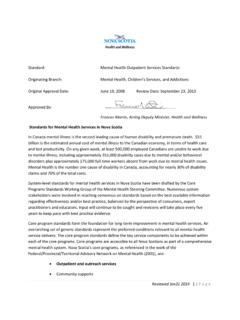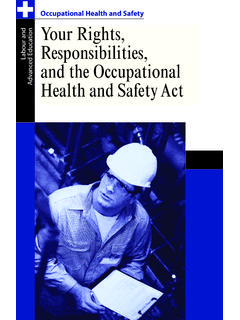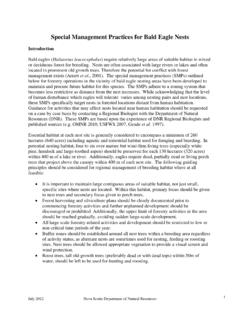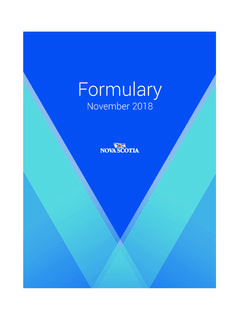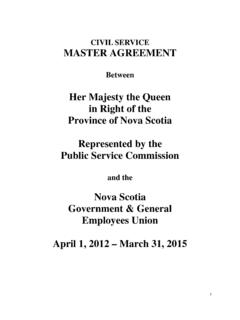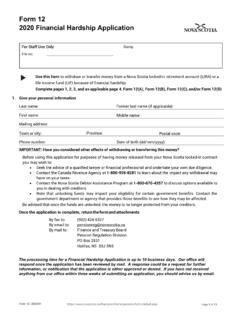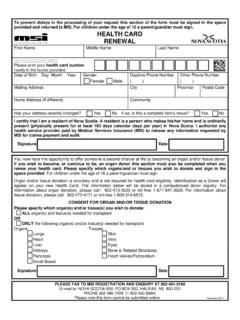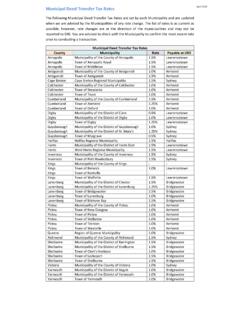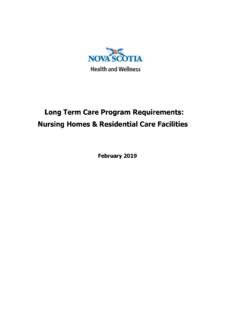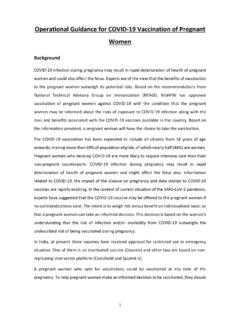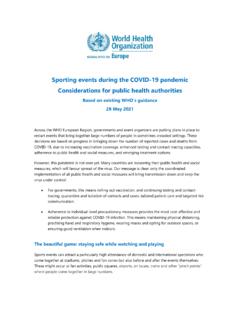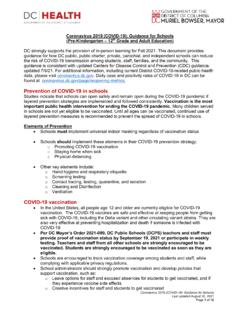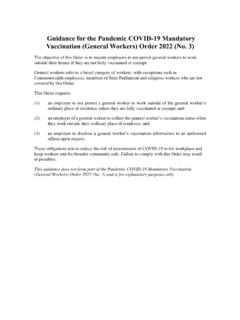Transcription of COVID-19 Mandatory Vaccination Protocol in High-Risk …
1 Mandatory Vaccination Protocol in High-Risk Settings October 6, 2021 (as amended March 21, 2022) Introduction: a) The Chief Medical Office of health is responsible for ensuring Nova Scotians are optimally protected in workplace settings where the risk of contracting and transmitting COVID-19 is high;b) In Nova Scotia, the ongoing presence of COVID-19 variants of concern, including the Delta variant, poses significant risk to our population;c) Achieving high COVID-19 immunization rates through Vaccination is part of a range of actions that can help prevent and limit the spread of COVID-19 ;d) The Nova Scotia COVID-19 Vaccination Program has made, and continues to make, vaccines available to all Nova Scotians;e) There is higher risk of both infection and transmission of COVID-19 by persons who are not fully vaccinated. This also poses a risk to those who are vaccinated, particularly in light of the Delta variant and other current and emerging variants of concern; f) It is necessary to set out a consistent, provincial approach to COVID-19 protection in settings where the risk of contracting and transmitting COVID-19 is high; g) It is also necessary to ensure Nova Scotians working and volunteering in settings where there is high risk of contracting and transmitting COVID-19 have access to the information required to make informed decisions about COVID-19 Vaccination ;h) Employers and operators in sectors where there is a high risk of transmission will play a key role in ensuring this Protocol is implemented effectively and in accordance with public health principles.
2 Therefore, employers and facility operators need to know the Vaccination status of employees, outside service providers and volunteers to implement infection prevention and control measures to protect patients, residents, clients and other personnel; ) The Chief Medical Officer of health requires the aggregate, non-identifiable information regarding Vaccination rates in each of the identified High-Risk settings to support the management of the public health response to the pandemic;j) This Protocol has been developed with consideration of the interests of persons who have a valid medical contraindication against receiving COVID-19 vaccine as supported by either a physician or a nurse practitioner; andk) This Protocol has been further developed with consideration of the interests protected by Nova Scotia s Human Rights Act and the privacy interests of impacted employees, outside service providers, volunteers, visitors and designated care givers with a view to balancing the interests of the public, including constitutionally protected interests, against the risk of harm to other personnel as well as to those who receive care and services in High-Risk settings.
3 Definitions Designated Care Giver means a person (other than the parent or legal guardian of a minor, as defined in the Age of Majority Act) who, in the following settings, is the family member and/or support person who has been designated by a resident, client, patient or their substitute decision maker and the facility where they reside, who has been regularly involved in the resident s life, supporting their health and well-being: A hospital as defined by the Hospitals Act; Long-term care facilities licensed under the Homes for special Care Act; Privately-operated long-term care facilities; Community Hospice Operators and Community Hospices as defined in the Community Hospices Regulations made under Section 78 of the health Authorities Act; Homes licensed by the Minister of Community Services under the Homes for special Care Act; Child-caring facilities approved or operated by the Minister of Community Services under the Children and Family Services Act, except foster homes; Organizations primarily funded by the Minister of Community Services that provide residential placements and supervision to: Participants of the Disability Support Program, including Temporary Shelter Arrangements, Independent Living Support and Supervised Apartments; and Children and youth in the care of the Minister of Community Services under the Children and Family Services Act, Organizations primarily funded by the Minister of Community Services that provide Adult Day Programming for persons with disabilities; and Organizations primarily funded by the Minister of Seniors and Long-Term Care that provide Seniors Adult Day Programming for seniors.
4 Employer or Operator in a High-Risk Setting means the employers and operators of the following: A hospital as defined by the Hospitals Act; A health Authority as defined in the health Authorities Act; A home care agency funded under the Homemaker Services Act; Emergency health services, ambulance services and communications centre as defined in the Emergency health Services Act; An office of 811 Telehealth; An office of Nova Scotia Hearing and Speech; A long-term care facility licensed under the Homes for special Care Act; Privately-operated care facilities for seniors, along with independent or assisted living services for seniors; Privately-operated home care services and agencies; Community Hospice Operators and Community Hospices as defined in the Community Hospices Regulations made under Section 78 of the health Authorities Act; Homes licensed by the Minister of Community Services under the Homes for special Care Act; Child-caring facilities approved or operated by the Minister of Community Services under the Children and Family Services Act, except foster homes; Organizations primarily funded by the Minister of Community Services that provide residential placements and supervision to: Participants of the Disability Support Program, including Temporary Shelter Arrangements, Independent Living Support and Supervised Apartments; and Children and youth in the care of the Minister of Community Services under the Children and Family Services Act, Organizations primarily funded by the Minister of Community Services that provide Adult Day Programming for persons with disabilities.
5 Organizations primarily funded by the Minister of Seniors and Long-Term Care that provide Seniors Adult Day Programming for seniors; and Correctional facilities as defined in the Correctional Services Act. Fully vaccinated means that a person is considered fully vaccinated against COVID-19 in the follow circumstances: 14 days or more after receiving the second dose of a two-dose series of a health Canada authorized COVID-19 vaccine (Moderna, Pfizer-BioNTech, AstraZeneca) following minimum dosing intervals. This includes a mix of these vaccines, such as one dose of AstraZeneca and one dose of Moderna; 14 days or more after receiving a one-dose series of a health Canada authorized COVID-19 vaccine (Janssen/Johnson & Johnson); or 14 days or more after receiving the final dose of any other World health Organization authorized series of COVID-19 vaccine (such as Sinopharm or Sinovac).
6 health Care Facility means: A hospital as defined by the Hospitals Act; A health Authority as defined in the health Authorities Act; A home care agency funded under the Homemaker Services Act; Ambulance services as defined by the Emergency health Services Act; and An office of Nova Scotia Hearing and Speech. Not fully vaccinated means no receipt of any vaccine dose or receipt of 1 dose of a vaccine authorized as a 2 dose vaccine series such as Pfizer, Moderna or AstraZeneca plus 14 Outside service provider means: In a health care setting: a physician, nurse, physiotherapist, occupational therapist, home support worker, faculty member of a health care or personal care educational or training facility, student engaging in a training opportunity with the Employer, emergency medical assistant/paramedic present in a facility on a non-urgent basis, patient transport worker or any other non-staff member who provides health care or personal care to a resident, but does not include a visitor or designated care giver.
7 In a community services residential and day programming setting: a non-staff person providing health or personal care, mental health , social, education, access, transportation, recreation, or food services and a student participating in a training opportunity, or any other non-staff member contracted or engaged by the Employer or otherwise authorized to provide programs or services for participants on site, but does not include a visitor or designated care giver; and In a correctional setting, a non-staff person providing health or personal care, mental health , social, education, access, transportation, recreation, or food services and a student participating in a training opportunity, or any other non-staff member contracted or engaged by the Employer or otherwise authorized to provide programs or services for offenders or persons in custody, but does not include a visitor or designated care giver.
8 Personnel means any employee, outside service provider or volunteer of an Employer or Operator in a High-Risk Setting . Proof of Vaccination means a document issued by the government or non-government entity that administered the COVID-19 vaccine that meets the criteria set out in Appendix A: Acceptable Forms of Proof of Vaccination . Universal Pandemic Precautions : means the use of a mask and face/eye protection (hospital supplied mask with visor, face shield, or goggles) for all direct patient contacts. Vaccine means a vaccine against COVID-19 that has been approved by either the Public health Agency of Canada or the World health Organization. Visitor means anyone entering the facility of an Employer or Operator in a High-Risk Setting who is not Personnel except a child who is less than 12 years of age; a patient as defined in the Hospitals Act; or any person entering a foster home as defined by the Child and Family Services Act.
9 Volunteer means a person who gives freely of their time and skills, without monetary compensation, within a facility overseen by an Employer or Operator in a High-Risk Employers and Operators in a High-Risk Setting Every employer and operator shall require all personnel, designated care givers and visitors to provide one of the following before November 30, 2021 For employees and designated caregivers, provide proof of Vaccination of COVID-19 vaccine administration as per the following requirements: if the person is partially vaccinated, proof that the first dose was administered and within 70 days from the first dose, proof of administration of the second dose; or if the person is fully vaccinated, proof of all required For outside services providers, volunteers and visitors, provide proof that they are fully vaccinated, with proof of administration of all required doses of COVID-19 Written proof of a valid medical contraindication against receiving COVID-19 vaccine provided by either a physician or a nurse practitioner.
10 A physician or nurse practitioner may complete and sign a Valid Certificate of Medical Contraindication for COVID-19 Vaccination letter attesting that the person (their patient) has a valid medical contraindication that prevents Vaccination , as approved by the Chief Medical Office of health , setting out: that the person cannot be vaccinated against COVID-19 based on one of the following valid medical contraindications: a history of severe allergic reaction ( anaphylaxis) after previous administration of a COVID-19 vaccine using a similar platform (mRNA or viral vector); an allergy to any component of the specific COVID-19 vaccine or its container (polyethylene glycol for the Pfizer-BioNTech and the Moderna vaccines); a history of major venous and/or arterial thrombosis with thrombocytopenia following Vaccination with the AstraZeneca COVID-19 vaccine; a history of capillary leak syndrome following Vaccination with the AstraZeneca vaccine; a history of myocarditis and/or pericarditis after a first dose of an mRNA COVID-19 vaccine (Pfizer-BioNTechdec or Moderna); or experienced a serious adverse event after receiving a first dose of COVID-19 vaccine.
